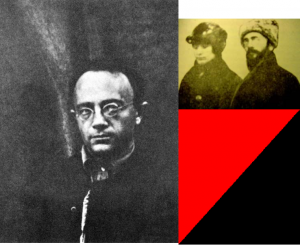The Jewish activists played an important role in the revolutionary movement, which originated in the Russian Empire at the turn of the XX century and eventually led to the Bolshevik Revolution of 1917 and the establishment of the USSR. Some opposers of the revolution even labeled it the ‘Jewish’ one, due to a substantial number of Jewish people (Leon Trotsky being the best known example) behind the turnover. This period of Russian history was indicated by a massive rise of various movements. Workers, communists, anarchists, zionists, independence fighters were all starting their fight. Many of these were indeed lead by Jewish people or actually were Jewish movements (like zionism or BUND , Jewish Workers’ Union). Some memories have survived the massive repressions of the 1930s, which have demolished what was left of the revolutionary spirit. Some were completely forgotten. Aron Baron was probably one of the most rebellious and unchained leaders, causing unrest in any place he arrived to. But while many were fighting hard for the new government to take power, Baron’s life goal was to fight any form of government, power and order.
Aron Baron was a 15-year old Jewish baker boy from a small village in Kyiv region when he took part in a strike movement of Kyiv bakers union. It was in 1906. Baron’s journey has begun. He was arrested and sent to Siberia. He manages to flee to Chicago, where he joins the anarchists’ movement together with his wife Fanni. While in the USA, Baron becomes an active fighter for workers’ rights. He is a member of Industrial Workers of the World, an editor of ‘The Alarm’ and an active contributor to a number of other workers movement’s newspapers; collaborates with Jewish, American and Russian anarchists and labor unions, participates and leads countless demonstrations, gets beaten, arrested and set free again.
In 1917 Aron and Fanni return to Kyiv to become a part of the turbulent social and political life there. The baker’s union hasn’t forgotten Baron and nominated him as a deputy to Kyiv’s workers parliament.
At the same time, with the start of the Russian civil war just after the Bolshevik Revolution, Baron is assigned to form the first regiment of Ukrainian ‘red’ cossacks. In a week the army heads to the city of Poltava and captures it with Baron becoming the city’s governor. In the meanwhile, Baron solves the armed conflict between the anarchists and Soviets in Katerynoslav (modern-day Dnipropetrovsk). Though he doesn’t stay in the place for too long – German army enters Poltava and Aron together with other anarchists flees to Russian Rostov. In Rostov Baron proceeds with his mission – robbing banks, releasing prisoners and fighting the capitalists. Later Baron moves to Kursk, where he starts the local ‘The Alarm’ newspaper and creates and heads the Ukrainian Anarchist Confederation.
In 1918, together with the Soviet Army, Baron enters Kharkiv, Katerynoslav. Though apart of his army duties, Aron manages create Ukrainian Anarchist Confederation offices in the captured places. This doesn’t go in line with the Soviet’s strategy. After his lecture on ‘Anarchism and the Soviets’ in Katerynoslav, Baron is arrested.
Released again, Baron moves to Odessa – naturally, to publish his ‘The Alarm’. It gets banned by the Soviets. In couple of months he flees to Moscow. In some more months Baron gets accused of the explosion in a governmental building and gets to jail again. Released in 1920 and being seriously sick, Baron returns to Kharkiv. Collaborating with the head of Ukrainian anarchists Nestor Makhno, Baron still find time for writing for several newspapers, giving speeches at Kharkiv factories and labor unions and planing the all-Ukrainian anarchist assembly. Another plan Baron discusses with Makhno is a possibility to establish an autonomous anarchist land in Crimea. All of these plans, efforts and actions did not come true.
After 1920, Baron experiences never-ending arrests, being moved from one camp to another, tries to commit suicide, undertakes hunger strikes, being released and arrested again and again. He was executed in 1937.
Baron certainly was one of these forgotten fighters, drunken by the revolution and the possibility to change the world. His struggle, however right or wrong it was, was purely ideological, and that’s why execution alone was able to stop his fight.
Comments are closed.


